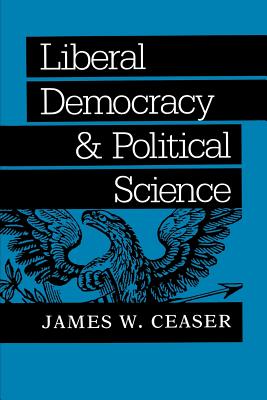Liberal Democracy and Political Science

Liberal Democracy and Political Science
Do political scientists in a liberal democracy bear a special responsibility that goes beyond their academic persuits? In Liberal Democracy and Political Science James W. Ceaser, a well-known scholar or American political parties and the presidency, argues that they do, and he challenges collegues and students to re-examine what they do as political scientists.
Ceaser begins with the observation that liberal democracy is a compound of two elements not easily wed--constitutionalism and republicanism. As such, it has a problem maintaining itself. The role of political science, he argues, is to perform the "superintending function" of keeping these parts together. Ceaser shows how traditional political science--an amalgam of historical sociology, a general political science of regimes, and a specific political science of different countries--once provided a foundation for performing this function. He then describes the failing of contemporary political science, both predictive and what Ceaser call the "new normativism," in this regard. What is needed, Ceaser argues, is a reconstruction of political science that borrows freely from both past and present-day practice.
Ceaser concludes with a case study that puts his theory to work--and analysis of the susceptibility of our political culture to the influence of intellectuals and to contemporary critics of the Constitution.
PRP: 343.58 Lei
Acesta este Prețul Recomandat de Producător. Prețul de vânzare al produsului este afișat mai jos.
309.22Lei
309.22Lei
343.58 LeiIndisponibil
Descrierea produsului
Do political scientists in a liberal democracy bear a special responsibility that goes beyond their academic persuits? In Liberal Democracy and Political Science James W. Ceaser, a well-known scholar or American political parties and the presidency, argues that they do, and he challenges collegues and students to re-examine what they do as political scientists.
Ceaser begins with the observation that liberal democracy is a compound of two elements not easily wed--constitutionalism and republicanism. As such, it has a problem maintaining itself. The role of political science, he argues, is to perform the "superintending function" of keeping these parts together. Ceaser shows how traditional political science--an amalgam of historical sociology, a general political science of regimes, and a specific political science of different countries--once provided a foundation for performing this function. He then describes the failing of contemporary political science, both predictive and what Ceaser call the "new normativism," in this regard. What is needed, Ceaser argues, is a reconstruction of political science that borrows freely from both past and present-day practice.
Ceaser concludes with a case study that puts his theory to work--and analysis of the susceptibility of our political culture to the influence of intellectuals and to contemporary critics of the Constitution.
Detaliile produsului










